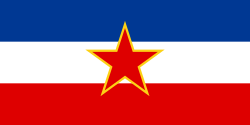| Yugoslavia at the 1992 Winter Olympics | |
|---|---|
 | |
| IOC code | YUG |
| NOC | Yugoslav Olympic Committee |
| in Albertville | |
| Competitors | 25 (22 men, 3 women) in 6 sports |
| Medals |
|
| Winter Olympics appearances (overview) | |
| Other related appearances | |
Yugoslavia was represented at the 1992 Winter Olympics in Albertville, France by the Yugoslav Olympic Committee.
Contents
- Competitors
- Alpine skiing
- Biathlon
- Bobsleigh
- Cross-country skiing
- Luge
- Speed skating
- External links
- References
In total, 25 athletes including 22 men and three women represented Yugoslavia in six different sports including alpine skiing, biathlon, bobsleigh, cross-country skiing, luge and speed skating.
This was the last time that the Socialist Federal Republic of Yugoslavia would compete at the Winter Olympics following the breakup of Yugoslavia.